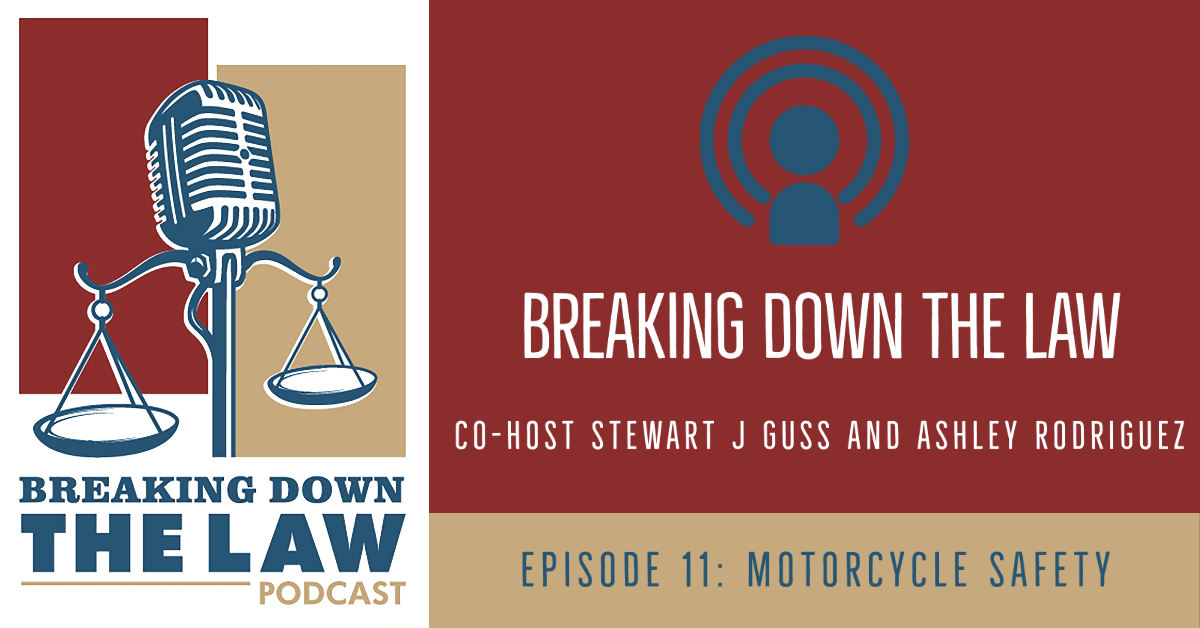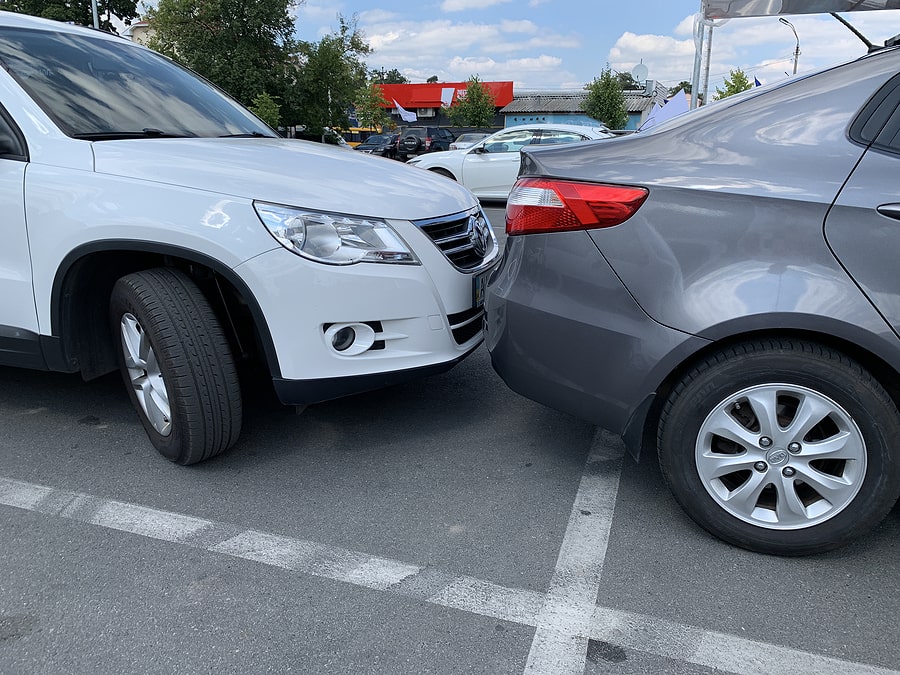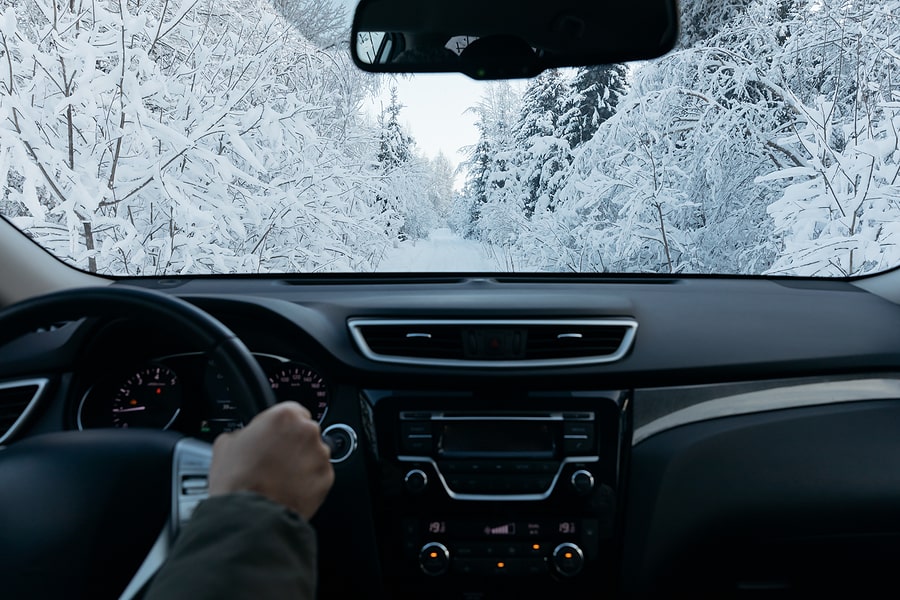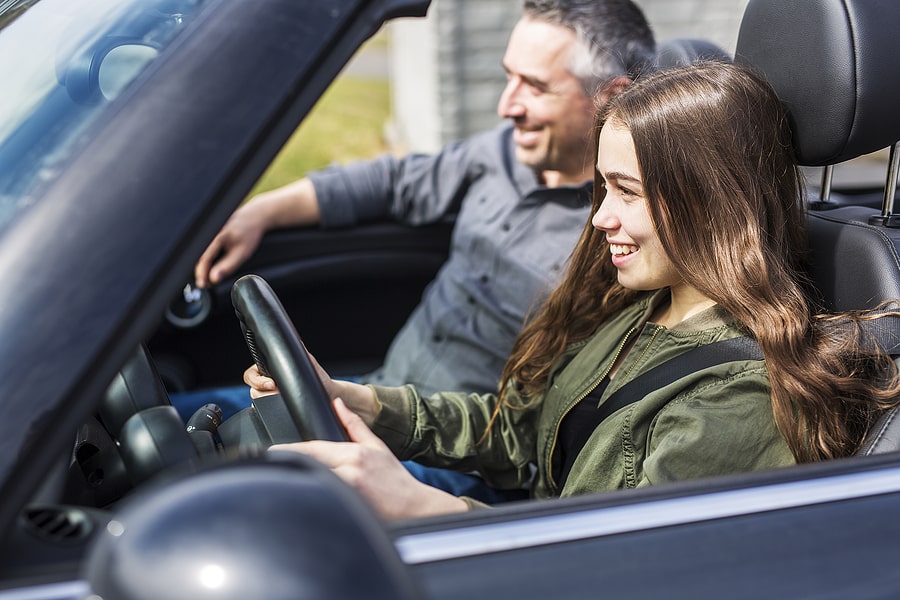For this episode of the Breaking Down The Law Podcast we’re joined by Brian Page, a personal injury lawyer in New Orleans who specializes in Personal Injury cases. He’s joined by Breaking Down The Law Podcast host, Ashley Rodriguez.
During today’s episode, Brian has a love for motorcycles but we also know that sometimes comes with extra safety measures that need to be taken!
- Can you tell us a little bit why motorcycles can be dangerous?
- What is the most common cause of motorcycle accidents?
- What do you think are the top safety tips for motorcycle riders like what advice would you give them?
- How can you prevent an accident when you’re on a motorcycle?
- What happens if you are in a motorcycle accident? What should someone do right after that?
- What if like a family member was in a motorcycle accident, and unfortunately it is catastrophic. How would a family member go about taking care of everything after that?
- What are the main laws when it comes to riding a motorcycle and is it different from state to state?
Check out the full episode for more details!
Stay tuned for the next installment of the Breaking Down The Law Podcast with Stewart J Guss and Ashley Rodriguez!
Contact Us: 281-783-3934 or [email protected]
If you want to subscribe to our podcasts on your favorite podcasts player click here for all the links to each one!
Transcript [This transcript was created using an automated transcription service and may contain errors]
Intro : 0:09
Breaking down the law a podcast hosted by attorneys and legal specialists discussing everyday law and how it affects regular people, regular people. Let’s break down the law with our host, Stuart Gus and Ashley Rodriguez. They have the inside scoop on everything legal and newsworthy.
Ashley Rodriguez : 0:34
Welcome to breaking down the law. This is Ashley and today we have a special guest with us, Brian Page and he is one of our associate attorneys out of our New Orleans office. How are you doing, Brian?
Brian Page : 0:45
I’m doing well. Ashley, how are you today?
Ashley Rodriguez : 0:47
I’m great. So what made you get into personal injury law?
Brian Page : 0:52
Well, I happen to actually kind of fall into it during law school. A friend of mines uncle was a personal injury attorney and he was looking for some help. On a part time basis, I started working for him for a little while, and I really just fell in love with, you know, helping the clients and fighting insurance companies.
Ashley Rodriguez : 1:09
That’s awesome. So did you always want to be a lawyer?
Brian Page : 1:12
So I was told by my parents that I basically would argue with them from as soon as I can speak, and I distinctly remember some dinnertime conversations when I was still in middle school, Late Middle School or maybe early high school where I was told repeatedly by my parents that I either better be a used car salesman or an attorney because I just loved to to handle basically. So I figured going the attorney route would be a little bit more prestigious than these car sales,
Ashley Rodriguez : 1:39
Well probably. So today, we’re gonna talk about motorcycle safety to my understanding that you enjoy motorcycles right and you ride to Brian.
Brian Page : 1:49
Yes, I do. I’ve I’ve had a motorcycle license since I was 16. I basically got it at the same time as my driver’s license. I currently have a 1974 BMW 900 That was my father’s that I have memories of right around Lake Michigan on the back of this when I was eight or nine years old.
Ashley Rodriguez : 2:08
That’s awesome. So you’ve been riding motorcycles since you were 16. But can you tell us a little bit why motorcycles can be dangerous?
Brian Page : 2:18
Well, I mean, it’s kind of obvious when you just look at them. I mean, you’re sitting there, you’re exposed and you don’t have the safety of a steel cage around you like you do and, you know, a car or a truck. There’s some balance issues also with them at low speeds. So inherently, it’s just a little bit more dangerous than a vehicle.
Ashley Rodriguez : 2:35
So what is the most common cause of motorcycle accidents?
Brian Page : 2:40
So again, when you’re on a motorcycle, you’re a lot smaller than a car. So generally, what you will see with motorcycle accidents is people not seeing you. You know, you’re taught when when you learn to ride to stay out of blind spots, much more importantly than you are in a vehicle. Also, a lot of times There are, you know, people when you’re coming down the road towards them and they don’t see you and they pull out in front of you. You know, it’s been a lot of lane change issues with with that again with with blind spots and then just inherently You’re much smaller than a car. So that’s oftentimes why you’ll see a lot of motorcycles will have additional lighting on them, you know, that not only looks kind of cool, but that’s actually a safety issue. Oftentimes, you’ll also see a lot of motorcycle riders will wear like high visibility vests, like the guys that are working on, you know, the streets when they’re out there in traffic just so that it adds an additional layer of potentially being noticed and that that’s what’s important is to try to avoid the accident.
Ashley Rodriguez : 3:41
Yeah, to avoid the blind spots. What totally makes sense. So what do you think are the top safety tips for motorcycle riders like what would you give them?
Brian Page : 3:50
Well, first and foremost, it’s going to be you know, your equipment, you always want to ride a helmet. In most states. Now helmets are mandated by law. It wasn’t that way when I began writing Also, you know, high visibility jacket, you know, protective pants, gloves and boots, things like that. One of the earliest tricks that I learned on a motorcycle, when you’re going down the road and someone’s either at a stop sign or stoplight where they have the potential to pull out in front of you, is you stare at the front wheel of the vehicle that is stopped. And that’s the first indication that you will see if they start to move. It gives you kind of an early warning thing and I actually use that while I drive a car. And I’ll also it’s, it’s kind of deceiving sometimes when you can’t really tell if someone’s starting to move or not. But if you stare right at that front wheel, you’ll see and start to move and then you’ll know that they may potentially be pulled out in front of you.
Ashley Rodriguez : 4:41
Wow, that’s a great tip. I never would have thought of that.
Brian Page : 4:44
Yeah, give it a try sometime. It’s it really is helpful.
Ashley Rodriguez : 4:48
How can you prevent an accident when you’re on a motorcycle?
Brian Page : 4:51
So really, when you ride you just have to be hyper vigilant. A lot of times, you know, I find myself and I and I assume other people do this also when you drop In a car, you know, you can get distracted, playing with the radio, glancing at your cell phone, you know, yelling at the kids in the backseat, that sort of thing. Really, when you’re on a motorcycle, your main focus is to be aware of everything that is around you both in front and behind. Be aware of everything that’s potentially coming off the side street. You just have to be hyper vigilant, being aware, assuming that everybody else on the road does not see you.
Ashley Rodriguez : 5:28
Yeah, you have to be like more defensive of a driver than
Brian Page : 5:31
Absolutely, yeah. Yeah, it’s it’s the most defensive driving that you can possibly do.
Ashley Rodriguez : 5:36
So we all want to avoid those accidents. But what happens if you are in a motorcycle accident? What should someone do right after that?
Brian Page : 5:50
Well, first and foremost, you want to try to get any sort of medical attention that you may need this the most important thing, unfortunately, a lot of times, you know, accidents involving motorcycles. are pretty catastrophic were in the injuries can be life threatening, if not, they can kill you. So if you are able to get up, walk around and not necessarily need to be, you know, taken off in an ambulance, that sort of thing. The procedure after an accident is pretty much the same as you would with a motor vehicle accident, you want to exchange insurance information, if you’ve got your phone, and if it’s working, you know, take a picture of the other drivers driver’s license and insurance cards so that you have that for your own records. Most insurance companies require you to let your own insurance company know when you were involved in an accident also. So you can call your own insurance company and it open a claim just so that they’re aware of it. So outside of you know, the medical attention that you may need. It’s basically the same thing that you would do following any sort of motor vehicle accident.
Ashley Rodriguez : 6:49
Yeah, exchange the information call the police take photos all of that.
Brian Page : 6:55
Right. Absolutely.
Ashley Rodriguez : 6:57
So what if like a family member was in a motorcycle accident, and then the unfortunate thing is catastrophic. How would a family member go about taking care of everything after that?
Brian Page : 7:11
Yeah. So again, that’s why it’s important to try to get the police involved, make sure a report is done. Everything is documented correctly about what took place too, especially if a family member involved in a motorcycle accident is not responsive at the time or unable to answer questions about what may have happened. It’s important to get a neutral third party in there to do the investigation. Most police officers have been trained in accidents, not necessarily reconstruction, but investigations. So you know, they’ll look for things physical markings on the pavement, skid marks, things like that, where the debris is after an accident and they can come to, you know, a pretty solid conclusion as to what may have taken place in that accident. If the police are not involved, and you’ve got somebody that is either you know, incapacitated or Worst case scenario killed, the other person involved in the accidents version of what took place is going to be the only record of what really happened. So that’s why it’s important to get the police involved so that they can do their investigation and create a report that then the family member can use when approaching the insurance company for the other driver.
Ashley Rodriguez : 8:21
totally makes sense. So, since you practice in Louisiana, what are the main laws to ride a motorcycle? And is it different from other states.
Brian Page : 8:33
So when I originally started riding the motorcycle at 16, I actually lived in Illinois at the time. So in Illinois, it did have a different type of process by which you needed to acquire your driver’s license. And there was a mandatory class that took place over a Friday evening, all day, Saturday, all day Sunday, that at 16 that you were required to take to be able to get licensed as a motorcycle rider in Louisiana. It’s a little bit Different, you can take a motorcycle safety course, which if you pass will automatically get you a motorcycles license. But it’s not necessary in Louisiana, you basically have to go to, you know, the Office of motor vehicles, you’d need two forms of identification to provide to them. There’s a fee, I believe that it’s about $20 fee that you have to pay, then you can take a written exam by motorcycle knowledge. There’s some online tests that you can take for practice to get prepared for that. If you pass the written test, then you need to pass an on cycle test, which basically means you have to provide your own motorcycle, your own helmets, and eye protection if you don’t have you know, face covering on the helmet or a windshield on the motorcycle. And then you basically ride around while being observed by you know, the person giving the test. And so for example, in my case, I already had the motorcycle but when I moved to Louisiana, they did not carry on Over my endorsements. So when I went back to get my Louisiana motorcycles license, I actually had to have a buddy of mine, ride my motorcycle to the OMD, you know, with with my equipment at which time then I took the test in front of the person administering the test and then was able to just ride off the lot after I passed it. So it’s a little bit different because it’s kind of counterintuitive that you’d be going to get your license, but you have to provide your own motorcycle. So you may need a buddy to go with you.
Ashley Rodriguez : 10:28
And that makes sense. Yeah. And it’s not the same as like they have to watch you versus them being in the car with you.
Brian Page : 10:34
Yeah, I don’t think any of the instructors would probably want to jump on the back of a motorcycle or somebody who’s testing to get their license.
Ashley Rodriguez : 10:41
Definitely not. I mean, it’s already bad enough when they have to get in the car, right? Yeah, absolutely. So is there any last tips you would like to say about motorcycle safety or if you’re in a motorcycle accident?
Brian Page : 10:56
Yeah, just in general, you know, being very vigilant if you’re going to take the steps to get motorcycles licensed and you want to ride motorcycles. I mean, it’s great, you know, it’s a great pleasure to ride motorcycles. But, you know, obviously it is inherently more dangerous than a vehicle, especially if you’re in a city, you know, like New Orleans or Houston where there’s a lot of traffic and a lot of people on the road, ideally, you know, in a perfect world, we’d all just ride motorcycles out on open roads and you know, enjoy the scenery and that sort of thing. But on a day to day basis, that’s just not possible. So, when riding you know, Always wear your protective equipment, be as visible as possible. Be hyper vigilant and be very defensive and just assume I mean, I always tell anybody that rides or is thinking about right and you just have to assume that the other drivers do not see you at all, and operate your motorcycle in that fashion.
Ashley Rodriguez : 11:46
Thank you. And once again, we are breaking down the law with motorcycle safety with Brian Page out of our New Orleans office. We operate in all 50 states and have several associate attorneys in different states. So, if you’ve been in a motorcycle accident and you need some help, reach out to us at 281-783-3934 and thank you





